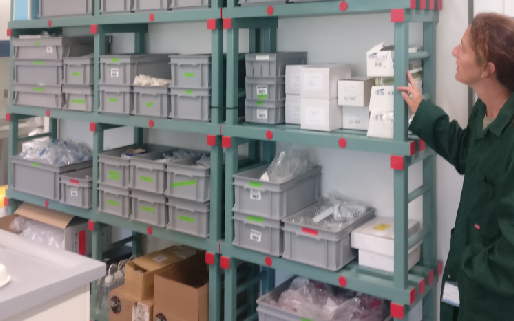How to keep your stock up to date in the lab?
Scroll down for English
Een warehouse per lab?
Twee jaar geleden ontwikkelden we voor de Radboud universiteit de functionaliteit voor een centraal warehouse. Die omvat een catalogus van produkten die centraal worden ingekocht en vervolgens op afroep worden doorgeleverd naar de verschillende labs. De kosten ervan worden netjes doorbelast in het financiele systeem.
Inmiddels hebben we enkele varianten ontwikkeld waaronder een variant waarmee individuele labs hun lokale voorraad eenvoudig op peil kunnen houden. Dat werkt als volgt.
De voorraad verbruiksartikelen is opgeslagen in een stellingkast op het lab waar onderzoekers direct kunnen pakken wat ze nodig hebben voor een experiment. Dat kunnen PCR tubes zijn, handschoenen, erlenmeijers etc.
Enkele keren per week loopt de lab manager langs de stellingkast en scant de Lab Servant barcode van de artikelen die op dreigen te raken. Die barcode staat in een lokale “catalogus” tezamen met alle kenmerken van het artikel die nodig zijn voor een herbestelling (leverancier, artikelnummer, omschrijving, storage location etc.). Op basis daarvan wordt na het scannen automatische een herbestelling aangemaakt in de Lab Servant die alleen nog gecontroleerd hoeft te worden en daarna direct naar het Corporate Procurement Systeem (CPS) wordt doorgezet. Er komt dus behalve het scannen geen menselijke handeling aan te pas anders dan het drukken op een knop om de order te bevestigen. Dit bespaart tijd en de voorraad blijft op deze manier eenvoudig op orde.
Momenteel wordt dit uitgerold voor 13 labs bij TU Delft afdeling Bionano science.
Deze feature is ook beschikbaar voor andere Lab Servant gebruikers die er gebruik van willen gaan maken.
A warehouse per lab?
Two years ago we developed the functionality for a central warehouse for Radboud University. This comprises a catalogue of products that are centrally purchased and then delivered on demand to the various labs. The costs thereof are neatly charged in the financial system.
We have now developed a number of variants, including a variant with which individual labs can easily keep their local stock up to standard. That works as follows.
The stock of consumables is stored in a rack cabinet at the lab where researchers can immediately take what they need for an experiment. That can be PCR tubes, gloves, Erlenmeijers etc.
A few times a week the lab manager walks past the rack cabinet and scans the Lab Servant barcode of the items that are running out. This barcode is recorded in a local “catalogue” together with all the characteristics of the article that are required for a reorder (supplier, article number, description, storage location, financial code et cetera). On the basis of the scan, a reorder is automatically created in the Lab Servant, which only needs to be checked and then transferred directly to the Corporate Procurement System (CPS). So, apart from scanning, no human action is involved other than pressing a button to confirm the order. This saves time and the stock remains up to standard in this way.
Currently (Oct 2018) this is being rolled out for 13 labs at the TU Delft department of Bionano science.
This feature is also available for other Lab Servant users who want to make use of it.



